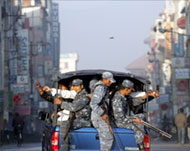Strike call after Nepal clashes
Nepal’s main political parties have called for a national strike to protest against the arrest of hundreds of pro-democracy protesters in Kathmandu.

The call comes after riot police fired teargas rounds and launched baton charges at protesters in Kathmandu on Saturday, leaving at least 50 people injured.
An alliance of seven political parties who oppose the regime of King Gyanendra said it planned to hold the strike on Thursday.
Protesters threw bricks and stones at police a day after authorities stopped a planned rally by imposing curfew in the capital.
About 300 protesters were arrested and taken away in trucks as police tried to keep protesters out of the main Basantapur square where the rally had been due to take place.
However, groups of demonstrators, sometimes up to 200 strong, played cat and mouse with police through the narrow streets of Kathmandu‘s old quarter and around its ancient temples.
Deserted streets
Soldiers had patrolled the deserted streets of Kathmandu on Friday to enforce a daytime curfew and thwart a planned mass protest.
 |
|
Police imposed a curfew in order |
Although the curfew was relaxed on Saturday, the protests still contravened a ban on them in central Kathmandu, imposed after King Gyanendra sacked the government and seized absolute power last February.
The government detained more than 100 politicians and human rights activists earlier in the week and rounded up several hundred more activists on Friday.
The leaders of the country’s main political parties have all been placed under house arrest for up to three months.
The United Nations, United States, India, Europe and Japan have all condemned the arrests.
Unlikely union
|
“We want democracy, down with autocracy” Protesters |
After the curfew was relaxed on Friday night, small groups of activists emerged from more than a dozen locations around the city and chanted pro-democracy slogans or held brief torchlight processions.
“We want democracy, down with autocracy,” one group chanted.
The parties have formed a loose alliance with Maoist rebels fighting a 10-year-insurgency to overthrow the monarchy and impose a single-party communist republic.
Although their aims differ, the parties and the rebels have agreed to cooperate to end what they call “the autocratic monarchy”.
On Friday evening, the Maoists attacked two small police posts in the southwestern town of Nepalgunj and killed four policemen, according to police.
The Maoists ended a four-month unilateral truce on 2 January, complaining that the government had failed to reciprocate. At least 50 people have died since then.